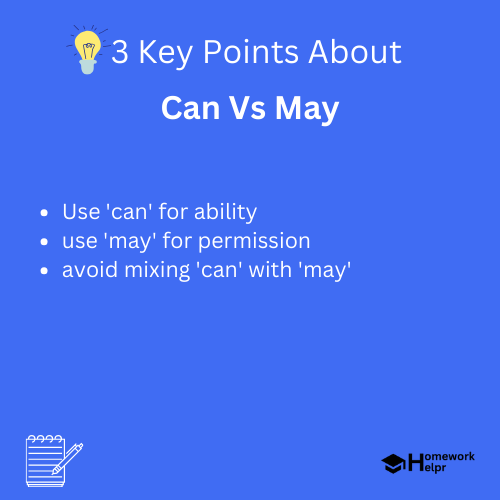📝 Summary
Understanding the difference between ‘can’ and ‘may’ is essential for clear communication. ‘Can’ indicates ability or capability, while ‘may’ expresses permission or possibility. For example, “I can swim” shows ability, whereas “May I leave?” asks for permission. It’s important to use ‘can’ for discussing what one is capable of and ‘may’ when seeking approval for actions. By understanding and practicing these distinctions, one can enhance their English language skills effectively.
Understanding the Difference Between ‘Can’ and ‘May’
The English language is full of words that can often confuse learners. Two such words are ‘can’ and ‘may’. While both are used to express possibility or ability, they are not interchangeable. Understanding the difference between them is crucial for proper communication.
What Does ‘Can’ Mean?
The word ‘can’ is primarily used to indicate ability or capability. When you say you can do something, it suggests that you have the necessary skills or resources to perform that action. For example:
- I can swim.
- She can speak three languages.
- We can finish the project on time.
In these examples, ‘can’ clearly denotes an ability that the speaker possesses. It answers the question of whether something is within one’s capacity or not.
Definition
Ability: The power or skill to do something.
Examples
Example: “He can ride a bike” indicates that he is capable of riding a bike.
What Does ‘May’ Mean?
On the other hand, ‘may’ is used to express permission or possibility. When you ask if you may do something, you are asking for permission. For example:
- May I leave the room?
- He may join us for lunch.
- They may go to the party if they finish their homework.
In these cases, ‘may’ is about seeking approval or indicating the potential for an event or action to occur.
Definition
Permission: The act of allowing someone to do something.
Examples
Example: “You may use my pencil” implies that you have permission to use the pencil.
When to Use ‘Can’ and ‘May’
While both ‘can’ and ‘may’ deal with possibility, knowing when to use them appropriately is essential. Here are some basic guidelines:
- Use ‘can’ when discussing ability.
- Use ‘may’ when asking for permission.
- Use ‘may’ also when discussing a potential outcome.
For example, saying, ‚ÄúI can drive” is about your ability to drive. Conversely, saying, ‚ÄúMay I drive?” is seeking permission to drive.
Fun Fact About ‘Can’ and ‘May’
❓Did You Know?
Did you know that ‘may’ has a more formal tone compared to ‘can’? In formal writing, it is often preferred to use ‘may’ when asking for permission.
Examples of Proper Usage
Let‚’ take a closer look at some examples highlighting the difference between ‘can’ and ‘may’:
- She can play the piano well.
- May I play the piano now?
The first sentence indicates her ability, while the second is a polite request for permission.
Examples
Example: “I can run fast” suggests you have the ability, while “May I run now?” asks if you have permission to run.
Common Mistakes with ‘Can’ and ‘May’
Many people often confuse ‘can’ and ‘may’ in their sentences. Here are some common mistakes:
- Using ‘can’ when asking for permission (e.g., “Can I go to the bathroom?”).
- Using ‘may’ to indicate ability (e.g., “I may swim”).
To correct these errors, always remember to associate ‘can’ with ability and ‘may’ with permission.
Tips for Remembering the Differences
To easily remember when to use ‘can’ and ‘may’, consider the following tips:
- Think of ‘can’ as an abbreviation for “capability.”
- Recall that ‘may’ sounds like “might,” which suggests possibility.
- Practice sentences with one and the other to develop an intuitive understanding.
Conclusion
Understanding the differences between ‘can’ and ‘may’ can greatly improve your communication skills. While ‘can’ emphasizes ability, ‘may’ focuses more on permission and potential. By practicing the correct usage of these terms, you can avoid common mistakes and communicate effectively.
In summary, always remember: if you’re discussing whether someone has the ability to do something, you’re probably looking to use ‘can’. If you‚Äôre asking for permission, then ‘may’ is likely the right choice.

Related Questions on Can Vs May
What does ‘can’ indicate?
Answer: It indicates ability or capability.
What does ‘may’ express?
Answer: It expresses permission or possibility.
When should I use ‘can’?
Answer: Use ‘can’ when discussing ability or skill.
Is ‘may’ more formal than ‘can’?
Answer: Yes, ‘may’ is often considered more formal.
